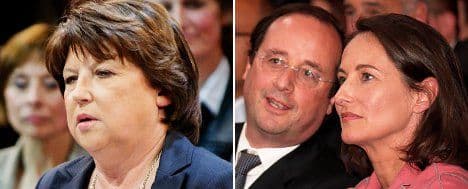Buoyant French left set to select its champion

With poll after poll suggesting they are within touching distance of ousting President Nicolas Sarkozy, France's left-wing opposition will vote to choose a champion on Sunday in determined mood.
Some observers had predicted that France's first US-style open primary -- any self-declared left-leaning voter can take part, not just card-carrying Socialists -- would split the opposition into warring camps.
But, with a few exceptions, debate has been civilised and policy-focused, and now former Socialist leader Francois Hollande seems to be edging clear of the pack to to be nominated as his party's presidential candidate.
In the likely event that Sunday's vote produces no absolute majority, a second round will be held a week later -- so there may still be surprises -- but the primary appears to have been a boon rather than a burden to the left.
Televised debates among the six front-runners have drawn large audiences, and a big turnout for the vote could kick-start the left's campaign for next April's main event while Sarkozy's camp struggles to keep up.
Sarkozy was elected in 2007 with a comfortable majority and went to work with vigour, but now the French economy is in crisis, unemployment remains high and his closest aides have been implicated in a series of scandals.
According to opinion polls of likely voters, either of the leading opposition candidates -- Hollande or Martine Aubry, former labour minister and creator of France's 35-hour working week -- would beat Sarkozy next year.
But first, one of them will have to beat the other.
Hollande is favourite. The latest IFOP poll predicts he will win the first round with 42 percent and the run-off against Aubry with 59 percent.
France has never organised such a primary, however, so it is not clear who the voters will be. Anyone who turns up on Sunday who is on the electoral roll, says he or she supports left-wing ideals and pays a single euro can vote.
Debates among the candidates appear to have generated public interest, and they have had busy campaign schedules, but there is no precedent by which to judge likely turnout or the make-up of the electorate.
Hollande has benefited greatly from the spectacular collapse of former IMF chief Dominique Strauss-Kahn's political career.
Strauss-Kahn had been favourite to return in triumph from Washington, win the Socialist primary and then sweep Sarkozy from office, until May, when he was arrested in New York and charged with sexually assaulting a hotel maid.
The US case against him collapsed, but Strauss-Kahn's long-planned campaign was sunk, and Hollande's equally careful preparation allowed him to fill the gap.
Since last year, the former Socialist general secretary has been on the trail, meeting voters, losing 10 kilos of unpresidential body fat and shaking off an image as a jovial but uninspiring party apparatchik.
"Hollande is like a left-wing austerity figure. He reassures the moderate voters, whose voices count in this time of economic concern," said analyst Remi Lefebvre, who studies the Socialists at Lille University.
In theory, Strauss-Kahn's heir should have been his ally Aubry, but his flame-out hurt her. When he revealed he had had a pact with Aubry that she would not oppose him, she appeared to be a substitute candidate.
The 61-year-old mayor of Lille has been pushing her achievements as a former minister and as a more activist party leader than Hollande, tacking to her rival's left on policy issues dear to likely primary voters.
"Aubry got a late start, but her strategy of mobilising left-wing civil society could pay off," Lefebvre noted.
The third place candidate and possible king- or queen-maker in the event of a second round, is 58-year-old Segolene Royale -- the Socialist's defeated candidate in 2007 and Hollande's former life partner.
Royale is still campaigning hard, but she may soon have to decide whether to urge her supporters to switch in the second round to her bitter long-time rival Aubry or to Hollande, the unfaithful father of her four children.
The chasing pack is rounded out by the two "young" candidates: 49-year-old Manuel Valls, a free-market pragmatist from the right of the party, and 48-year-old Arnaud Montebourg, who has campaigned on a protectionist ticket.
Jean-Michel Baylet, the 64-year-old head of the small, centrist Radical Party of the Left, is the only non-Socialist in the race -- the Greens having decided to nominate their own candidate for next year.
Faced with the depth of the sovereign debt crisis plaguing the eurozone, the main candidates have not made extravagant spending promises and have not diverged far from Sarkozy's relatively austere spending targets.
But they have nevertheless vowed to reverse the centre-right president's unpopular decision to increase the retirement ages from 60 to 62.
In policy debate among themselves, the Socialists have been determinedly polite, but as the race comes down to the wire Hollande has come under attack for his lack of ministerial experience, a possible Achilles' heel.
Join the conversation in our comments section below. Share your own views and experience and if you have a question or suggestion for our journalists then email us at [email protected].
Please keep comments civil, constructive and on topic – and make sure to read our terms of use before getting involved.
Please log in here to leave a comment.